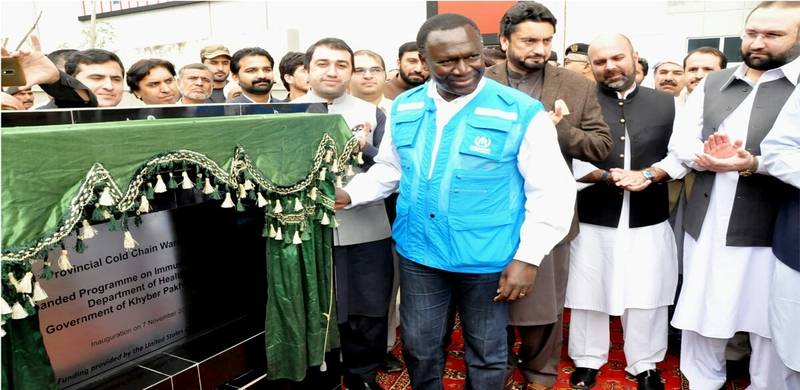
Peshawar
The Khyber Pakhtunkhwa Health Department has established a cold chain warehouse to store antigens as part of its drive to make the Expanded Programme On Immunisation (EPI) proactive and standardised.
The KP Health Department has collaborated with the United Nations Refugee Agency (UNHCR) and has inaugurated the first-ever cold chain provincial warehouse in order to provide storage facility for vaccines during immunisation campaigns.
EPI Director Mohammad Salim Khan has said that the construction of cold chain provincial warehouse in Peshawar was proof of the successful partnership between United Nations High Commissioner for Refugees and the KP Health Department, which was formalised in 2016 to include refugees in the delivery of immunization services.
Salim Khan further said that the cold chain provincial warehouse was constructed at a cost of $1.2 million.
The EPI director stated that vaccines of a sensitive nature would now be stocked in the provincial warehouse. These vaccines would include childhood tuberculosis, polio, diphtheria, pertussis, tetanus, hepatitis, meningitis, lose motions, pneumonia and measles vaccines.
Earlier, the federal EPI cell supplied the antigens to the EPI cell in KP each month. The demands for the vaccines steadily increased each year with population growth and newer type of antigens were added to the routine list. “For this reason, a bigger storage warehouse became the need of the time,” Salim said.
The warehouse will meet the needs of the entire population of KP, including all the Afghan refugees. All new-born children, children below the age of 5 years and women of child-bearing age, including pregnant and lactating women, will especially benefit from the programme due to the increase in the number of days of vaccination.
The warehouse will have a positive impact as the KP Health Department would be able to store the desired amount of vaccines along with the standard buffer stock.
Salim Khan said that with separate sections for dry storage and cold storage, the department would be able to manage the programme in an effective manner. He added, “The capacity to store extra vaccines will facilitate a timely response to outbreaks.”
According to the EPI director, the new cold storage warehouse would replace existing cold room facilities which were forty years old and were without a backup system to deal with mechanical and electrical failures.
The Khyber Pakhtunkhwa Health Department has established a cold chain warehouse to store antigens as part of its drive to make the Expanded Programme On Immunisation (EPI) proactive and standardised.
The KP Health Department has collaborated with the United Nations Refugee Agency (UNHCR) and has inaugurated the first-ever cold chain provincial warehouse in order to provide storage facility for vaccines during immunisation campaigns.
EPI Director Mohammad Salim Khan has said that the construction of cold chain provincial warehouse in Peshawar was proof of the successful partnership between United Nations High Commissioner for Refugees and the KP Health Department, which was formalised in 2016 to include refugees in the delivery of immunization services.
Salim Khan further said that the cold chain provincial warehouse was constructed at a cost of $1.2 million.
The EPI director stated that vaccines of a sensitive nature would now be stocked in the provincial warehouse. These vaccines would include childhood tuberculosis, polio, diphtheria, pertussis, tetanus, hepatitis, meningitis, lose motions, pneumonia and measles vaccines.
Earlier, the federal EPI cell supplied the antigens to the EPI cell in KP each month. The demands for the vaccines steadily increased each year with population growth and newer type of antigens were added to the routine list. “For this reason, a bigger storage warehouse became the need of the time,” Salim said.
The warehouse will meet the needs of the entire population of KP, including all the Afghan refugees. All new-born children, children below the age of 5 years and women of child-bearing age, including pregnant and lactating women, will especially benefit from the programme due to the increase in the number of days of vaccination.
The warehouse will have a positive impact as the KP Health Department would be able to store the desired amount of vaccines along with the standard buffer stock.
Salim Khan said that with separate sections for dry storage and cold storage, the department would be able to manage the programme in an effective manner. He added, “The capacity to store extra vaccines will facilitate a timely response to outbreaks.”
According to the EPI director, the new cold storage warehouse would replace existing cold room facilities which were forty years old and were without a backup system to deal with mechanical and electrical failures.
